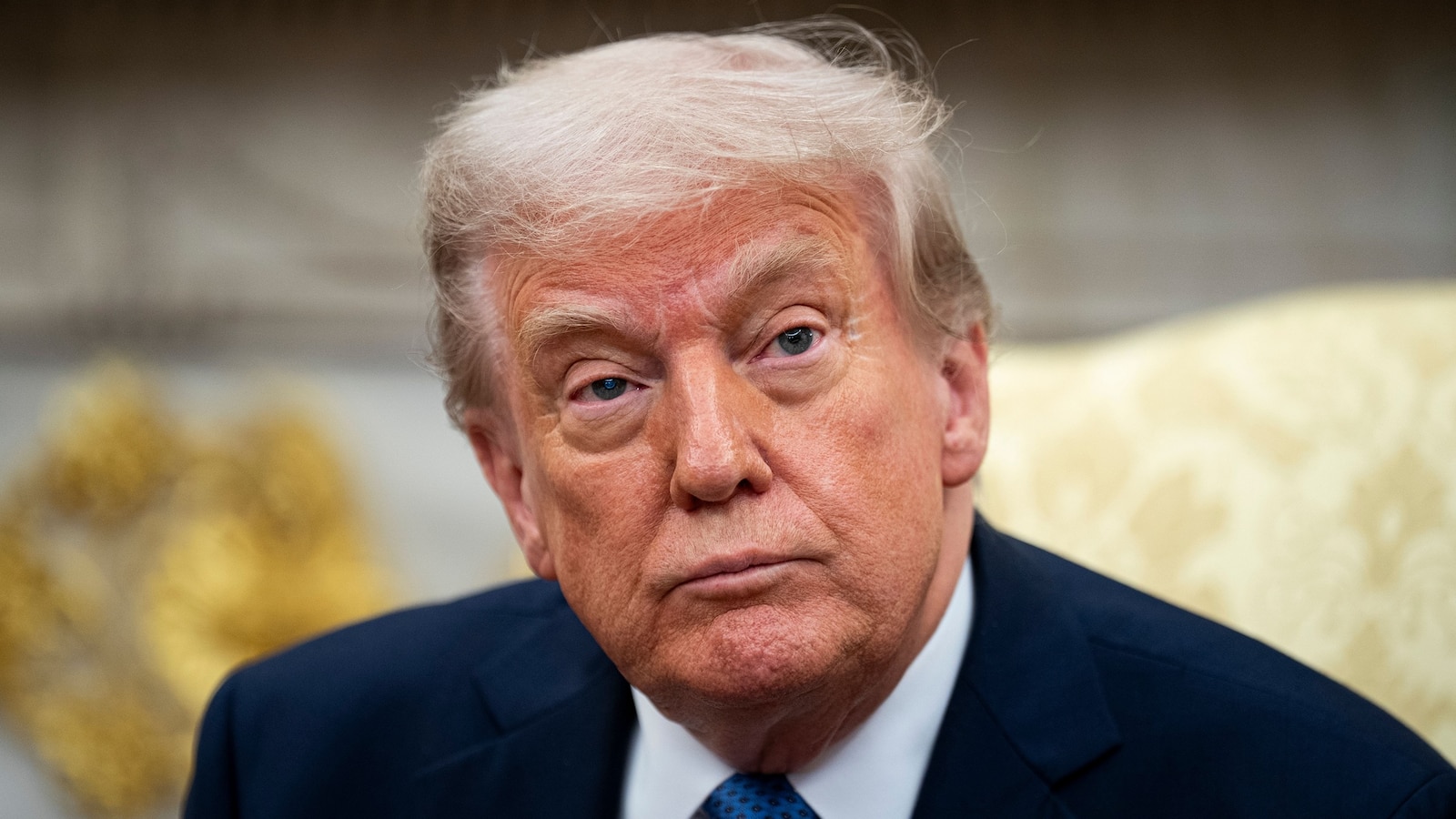Despite negotiations to end the war in Ukraine hitting a wall and a deadly Russian strike on the country’s capital city early Thursday, President Donald Trump remained insistent that talks had made “a lot of progress.”
“We’ll see what happens,” the president said during a bilateral meeting with the prime minister of Norway at the White House. “This next few days is going to be very important.”
Trump’s comments come as his negotiators have been pushing to bring the three-year-long conflict to a speedy end but encountering resistance to a U.S.-backed peace proposal from both Russia and Ukraine.
President Donald Trump during a meeting with Norway’s prime minister Jonas Gahr Store, not pictured, in the Oval Office of the White House in Washington, April 24, 2025.
Al Drago/Pool/EPA-EFE/Shutterstock
The president said he has a “deadline” in mind for talks to make progress, though he did not say what it was. Trump administration officials say they had initially hoped to have secured a negotiated settlement before the 100th day of the president’s second term next Tuesday, but that that goal now seems like a pipedream.
On Thursday, Trump issued a rare public rebuke of Russian leader Vladimir Putin after Moscow launched missile and drone strikes at Kyiv that killed at least 12 people, marking the deadliest attack on the capital city since the summer of 2024.
“Vladimir, STOP!” Trump wrote on his social media platform, Truth Social.
“I am not happy with the Russian strikes on KYIV,” he added. “Not necessary, and very bad timing.”

Damaged cars lie in a yard with other debris after a Russian ballistic missile attack in Kyiv, Ukraine, Thursday, April 24, 2025.
Efrem Lukatsky/AP
Despite the provocation from the Kremlin, the White House indicated no changes to Special Envoy Steve Witkoff’s plans to meet with Putin for the fourth time, and, when asked, Trump said he wouldn’t immediately move to impose any penalties on Russia in the wake of the strike.
“I’d rather answer that question in a week. I want to see if we can have a deal,” Trump said.

Russian President Vladimir Putin gestures while speaking to Alexander Troufanov, Yelena Troufanova and Sapir Cohen, who were released from Hamas captivity, during their meeting at the Kremlin, in Moscow, Russia, April 16, 2025.
Sofia Sandurskaya/Sputnik via AP
Since the onset of negotiations, the Trump administration has drawn criticism for being overly favorable to Moscow — an allegation the president disputed, insisting he is “putting a lot of pressure” on both parties.
“Very simply, I have, no allegiance to anybody,” he declared. “I have allegiance to saving lives.
Asked what concessions Russia has offered to get to closer to peace, Trump responded, “Stopping the war. Stopping taking the whole country. Pretty big concession.”

Ukrainian rescuers carry the body of a victim as they operate at the site of a Russian missile attack in Kyiv on April 24, 2025, amid the Russian invasion of Ukraine.
Genya Savilov/AFP via Getty Images
So far, neither Russia nor Ukraine has formally signed off on the administration’s framework for a peace settlement, which stipulates that the U.S. would recognize large swaths of seized Ukrainian land — including the strategically important peninsula of Crimea — as Russian territory.
Ukrainian leaders have indicated the terms are a nonstarter, and Secretary of State Marco Rubio abruptly cancelled plans to attend a round of high-level talks in London earlier this week after officials in Kyiv indicated that they would use the discussions to focus on securing a 30-day ceasefire rather than the U.S. framework, according to Trump administration officials familiar with the matter.
“This war is end-able,” Rubio said at the Oval Office on Thursday. “We’ve shown them the finish line. We need both of them to say yes.”

Secretary of State Marco Rubio speaks next to President Donald Trump and Secretary of the Treasury Scott Bessent, during a meeting with Norway’s Prime Minister Jonas Gahr Stoere in the Oval Office of the White House in Washington, April 24, 2025.
Kevin Lamarque/Reuters
At the State Department, spokesperson Tammy Bruce suggested that the U.S.-peace proposal was not a take-it-or-leave it option and that there was room for negotiation.
“What I’ve noticed here about Secretary Rubio and President Trump is flexibility,” said Bruce. “This is about human beings, having conversations, negotiating literally existential issues.”
But those skeptical of the Kremlin’s motives see Russia as intractable and argue it will take more than flexibility to push Moscow toward peace.
“Russia’s latest missile and drone barrage is a stark reminder that Moscow, not Kyiv, is the party responsible for starting this war and the party that should be held responsible for ending it,” said John Hardie, the deputy director of the Russia Program and the Foundation for Defense of Democracies.
“Yet while President Donald Trump has exhorted the Kremlin to make peace, he still has yet to bring tangible pressure to bear on Russia,” he continued. “This is not the path to a good deal.”












Leave a Reply